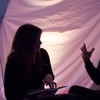These tabs have way more uses than getting off your face at a festival. Photo via Wikimedia
A medical historian in Canada recently stated that everyone's favorite hallucinogen, LSD, might make its way back to the medical scene—namely for use in palliative and geriatric care.Erika Dyck, a medical historian who works as a professor at the University of Saskatchewan, looked into LSD trials in the 1950s and 60s for her paper recently published in the Canadian Medical Association Journal to figure out why there was initial interest in the drug. "To see where some of that renewed interest is, some of the questions [of the past] are rather similar, and some have moved in different directions," Dyck told VICE.One of those different directions is the use of the drug in palliative (medical care for those with serious illnesses) or geriatric (medical care for the elderly) settings. Though Aldous Huxley, a well-known British intellectual and psychedelic pioneer, took LSD on his deathbed, the use of the drug for those nearing the end of their lives is a relatively new idea in the medical field."[Huxley] took it on his deathbed, and he talked about the ways in which that experience allowed him to face death and face the anxieties associated with death," Dyck said. "We know from other [hallucinogenic] studies—ayahuasca, peyote—we know that there have been elements of spirituality that confront death—that deal with death and mortality."In 2014, a trial conducted with 12 cancer patients showed the efficacy of LSD relieving anxiety in those with life-threatening diseases. In that study, results showed both a decrease in anxiety (77.8 percent of participants) and an increase in quality of life (66.7 percent) for those who took the drug.Dyck says that rather than LSD being a solution to an ailment, the drug could be used to help people manage what they might be going through mentally.However, she says, acid's reputation as a festival drug long associated with hippie and party culture could be detrimental to its chances of being used in a legitimate medical setting."It may be interesting that the same generation that engaged in recreational use of LSD are now perhaps the patients demanding it in a more medical context," Dyck told VICE. "One of the biggest challenges to any so-called psychedelic renaissance will be encountering that reputation that it has culturally as a drug of abuse."Follow Allison Elkin on Twitter.
Advertisement
